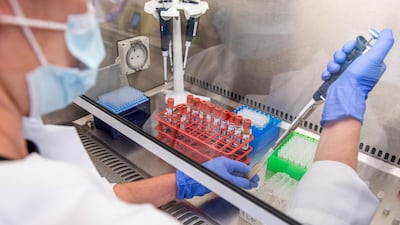A potential coronavirus vaccine being developed in the UK is showing positive results, according to a paper published in medical journal The Lancet.
The study, conducted by the University of Oxford and involving more than 1,000 volunteers, found that the vaccine was safe and triggered a response within 14 days that could help the body attack infected cells.
Researchers said it was too early to say whether the vaccine would be effective after one or two doses and continue to work for at least six months.
The team announced in May that it was recruiting more than 10,000 people for a second phase of trials in the UK, Brazil and South Africa.
Some volunteers reported experiencing fatigue and headaches after being given the vaccine but found the pain decreased after taking paracetamol.
If the vaccine, which was developed from a highly modified virus that causes the common cold in chimpanzees, proved to be effective, it could be manufactured on large scale.
British Prime Minister Boris Johnson welcomed the results of the study in a message on Twitter.
Prof Sarah Gilbert, who is heading the programme, said she was optimistic about the results.
“There is still much work to be done before we can confirm if our vaccine will help manage the Covid-19 pandemic, but these early results hold promise," she said.
The UK government has already signed a deal with the university and pharmaceutical company AstraZeneca to produce 100 million doses for the UK.
Shares in the company were up 0.4 per cent on the day after the positive findings were flagged last week.
"Today’s data increases our confidence that the vaccine will work and allows us to continue our plans to manufacture the vaccine at scale for broad and equitable access around the world," said Mene Pangalos, an executive vice president at AstraZeneca.
The study follows positive news from the US last week, when biotech company Moderna said it would start the final stage of trials on its vaccine this month after initial tests on a small group of volunteers were successful.
A development team including Pfizer and BioNTech also said two of four possible vaccines received "fast-track" designation from US officials.
The Oxford study was released as the UK government signed deals for 90 million doses of promising vaccines from the Pfizer consortium and vaccine specialist Valneva.
The British government is also investing in the expansion of a Valneva factory in Livingston, Scotland.
If the Oxford vaccine proves to be successful, it could provide enough doses for frontline health and social care workers and people in greater danger of dying if they become infected.
AstraZeneca will also supply treatment for people who cannot take vaccines on medical grounds.
“This new partnership with some of the world’s foremost pharmaceutical and vaccine companies will ensure the UK has the best chance possible of securing a vaccine that protects those most at risk," British Business Secretary Alok Sharma said.
Kate Bingham, who heads the government’s vaccine task force, said played down how successful a vaccine could be in the fight against the virus.
“The fact remains we may never get a vaccine and if we do get one, we have to be prepared that it may not be a vaccine which prevents getting the virus, but rather one that reduces symptoms," she said.


